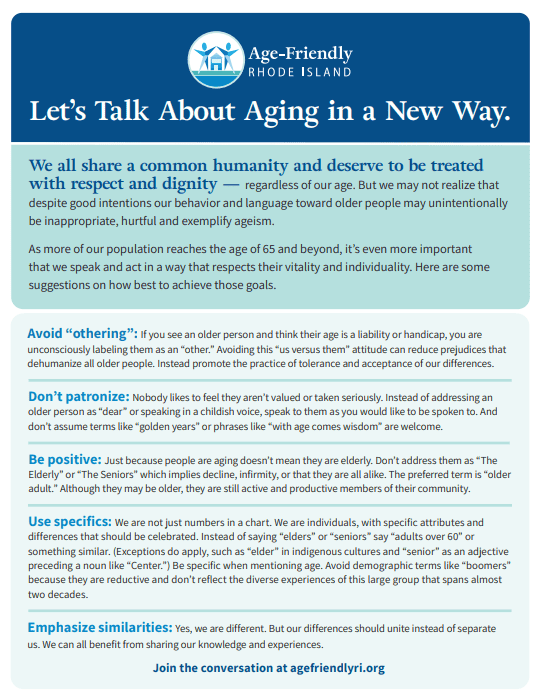Ageism Awareness Day: Reframing the Narrative Around Aging
As October 9 approaches, Ageism Awareness Day offers an important opportunity to highlight the widespread impact of ageism in our society. Rooted in stereotypes and misconceptions, ageism affects how older adults are perceived, treated, and valued. This not only harms individuals but also undermines the potential contributions older adults can make to their communities. Ageism doesn’t just affect older adults—it affects us all. By raising awareness, we can take collective action to reframe the way aging is viewed and create a more inclusive society for people of all ages.
The Impact of Ageism
In the U.S., 1 in 5 adults aged 50 and older report experiencing age discrimination, particularly in workplace settings, where stereotypes around competence and value often come into play. The effects of ageism are far-reaching. Research shows that older adults who internalize negative stereotypes about aging may have poorer health outcomes, including higher rates of cardiovascular disease and cognitive decline. The Journal of the American Medical Association (JAMA) found that ageism costs the U.S. healthcare system nearly $63 billion annually, primarily due to increased healthcare utilization stemming from negative biases against older adults.
In employment, ageism limits opportunities for older workers, despite evidence that they bring valuable experience, reliability, and mentorship skills to the workforce. The Urban Institute reports that nearly 60% of workers over age 50 face at least one major layoff, and many struggle to regain employment or face wage cuts, largely due to age discrimination.
Reframing Aging: A Call to Action
Ageism Awareness Day, celebrated on October 9, is an opportunity to reflect on how we can collectively challenge the harmful stereotypes and barriers that affect older adults. One of the central goals is to shift the narrative around aging from one focused on decline to one that celebrates growth, experience, and continued potential.
There are several ways individuals and organizations can help reframe the conversation:
1. Promote Positive Aging: Aging should be viewed as a normal and enriching part of life, rather than a period of inevitable decline. By highlighting the diverse experiences of older adults, we can challenge stereotypes and promote intergenerational connections.
2. Support Age-Inclusive Policies: Advocating for policies that address age discrimination in employment, healthcare, and social services can help create a more equitable environment. Age-inclusive policies ensure that older adults have access to the same opportunities as younger generations.
3. Engage in Conversations: Awareness starts with dialogue. Whether through social media, community events, or discussions with family and friends, spreading awareness about the impacts of ageism is critical to creating change.
In support of Ageism Awareness Day, organizations like the American Society on Aging (ASA) have made available free toolkits, graphics, and resources to help spread the word. These materials are designed to educate communities, inspire action, and equip advocates with the knowledge to combat ageism in their everyday lives. In recognition of Ageism Awareness Day, let’s commit to challenging our own biases, supporting older adults in our communities, and advocating for systemic changes that promote age equality. With concerted effort, we can reframe aging as a positive, enriching experience for all.

Download our guide to talking about aging in a new way
